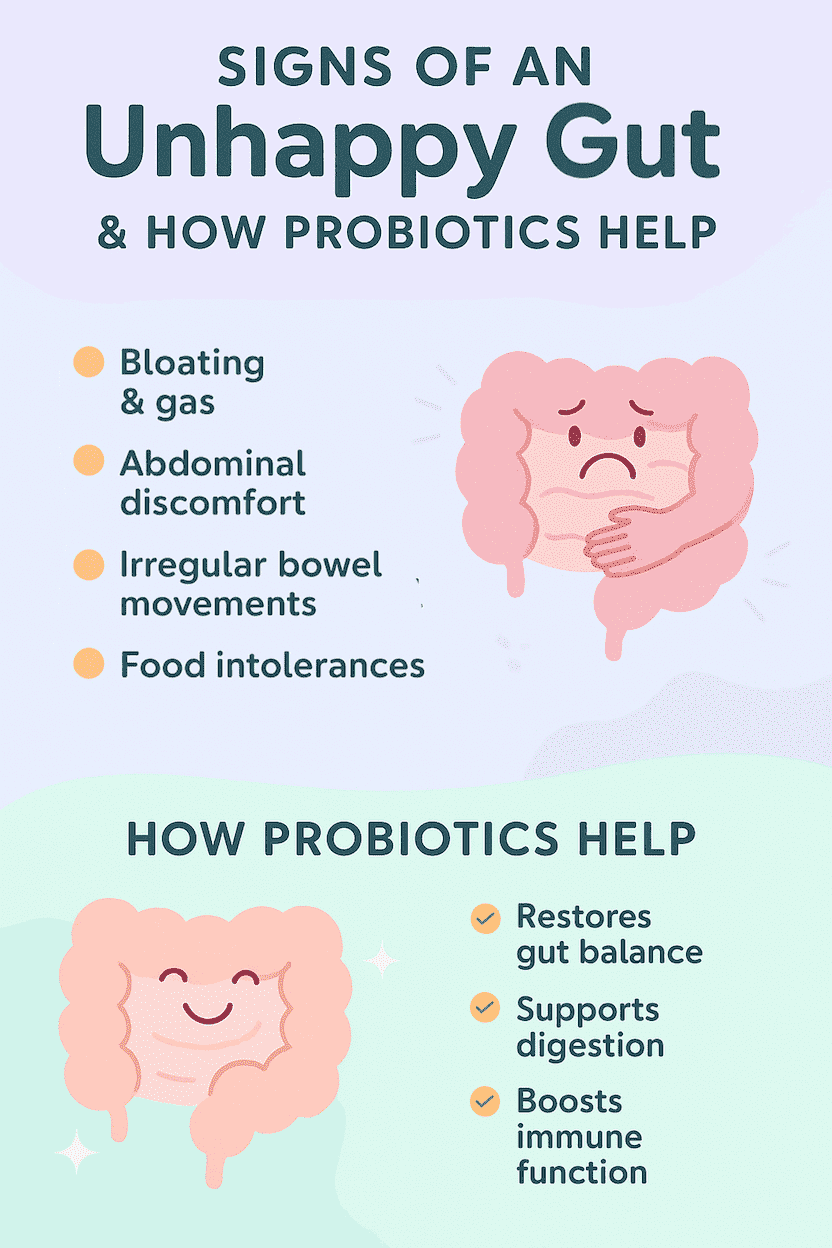Last update: November 6, 2025
4 minute read
Signs of an Unhappy Gut & How Probiotics Help
From bloating and brain fog to cravings and fatigue, your gut sends signals when it’s struggling. Here’s how probiotics and smart lifestyle choices can help restore balance.

By Derick Rodriguez, Associate Editor
Edited by Dr. Dimitar Marinov, MD, RDN, PhD

Does your gut ever feel like it’s running the show? When your digestive system is unhappy, the effects can ripple outward into your energy, mood, skin, and even immunity. Many people live with subtle gut symptoms, brushing them off as “normal,” when in fact they’re signals that your microbiome needs attention.
The good news? Recognizing these signs early gives you a chance to support balance before things spiral. And that’s where probiotics, the science-backed, friendly microbes, come in.
In this article, we’ll explore the key signs of an unhappy gut and show you how probiotics help restore harmony.
Key takeaways
- An unhappy gut has many faces: bloating, irregularity, fatigue, mood changes and more
- Your microbiome drives whole-body health, influencing digestion, immunity, and even gut-brain communication
- Probiotics can help rebalance gut bacteria, support barrier function, and ease many common gut-related symptoms
Why gut health matters
Your gut is more than a digestive tube; it’s a dynamic ecosystem that touches nearly every system in the body. Trillions of bacteria, yeasts, and other microbes form the gut microbiome, working around the clock to keep you balanced. When this ecosystem thrives, so do you.
- Nutrient absorption: Your gut breaks food into usable vitamins, minerals, and energy.
- Immune regulation: About 70-80% of immune cells live in and around your intestines.
- Barrier protection: A strong gut lining keeps toxins and pathogens out of the bloodstream.
- Mood and brain health: The gut communicates directly with the brain through the gut–brain axis.
- Metabolism: Microbes influence how you store fat, regulate blood sugar, and feel hunger or fullness.
When this balance tips, through poor diet, stress, illness, or antibiotics, your gut begins to show signs of distress. Learning to spot those early signals is the first step toward protecting your whole-body health.

6 common signs of an unhealthy gut
When your gut’s microbial community tips out of balance, your body sends warnings. Here are the most common:
Sign | What It Might Mean |
|---|---|
Bloating & Gas | Excess fermentation from microbial imbalance or small intestinal bacterial overgrowth (SIBO). |
Constipation or Diarrhea | Disrupted motility, inflammation, or impaired nutrient absorption. |
Fatigue | Poor nutrient absorption (B vitamins, iron, magnesium) and disrupted gut-brain communication. |
Weakened Immunity | Imbalanced microbiome affecting the 70–80% of immune cells housed in the gut. |
Brain Fog & Mood Shifts | Reduced serotonin and neurotransmitter support from the gut microbiome. |
Bad Breath or Coated Tongue | Dysbiosis, sluggish digestion, or bacterial/yeast overgrowth. |
How probiotics improve gut health
If these signs sound familiar, probiotics may offer meaningful support. Here’s how they work against the exact problems above:
Gut Symptom | How Probiotics Help | Example Strains Commonly Studied* |
|---|---|---|
Bloating & Gas | Compete with harmful microbes and reduce excess fermentation | Lactobacillus plantarum, L. reuteri |
Constipation or Diarrhea | Improve stool consistency, support motility, and ease loose stools | Bifidobacterium lactis, Saccharomyces boulardii |
Fatigue | Enhance nutrient absorption, produce short-chain fatty acids like butyrate to fuel energy | Bifidobacterium longum, L. casei |
Weakened Immunity | Stimulate antibody production and balance immune response | L. rhamnosus GG, B. animalis |
Brain Fog & Mood Shifts | Support through gut-brain axis | Bifidobacterium longum 1714, L. helveticus |
Bad Breath | Crowd out odor-causing microbes, improve digestion | L. salivarius, Streptococcus salivarius K12 |
Best practices for taking probiotics effectively
- Choose targeted strains: Different strains do different jobs; look for labels with strain IDs.
- Stay consistent: Most benefits take at least 2-4 weeks of daily use.
- Pair with prebiotics: Fiber-rich foods (onions, garlic, bananas, whole grains) feed the good bacteria.
- Include fermented foods: Yogurt, kefir, kimchi, and sauerkraut add natural diversity.
- Support lifestyle basics: Quality sleep, stress management, and minimizing processed foods amplify probiotic benefits.
— Dr. Dimitar Marinov, MD, RDN, PhDYour gut plays a central role in how you feel day to day, and when its balance is disrupted, symptoms can appear not only in digestion but also in energy, mood, skin, and immunity. Probiotics may help restore this balance by competing with harmful microbes, strengthening the gut barrier, and supporting the production of beneficial compounds like short-chain fatty acids.
Are probiotics safe?
Most people tolerate probiotics well, but mild bloating or gas can occur at first. Those with weakened immune systems or serious illnesses should consult a healthcare provider before starting supplements.
Quality matters. Choose products with third-party testing for purity and potency.
Frequently asked questions (FAQ)
Here are some of the most frequently asked questions about your gut health.
Final thoughts
Your gut is often the first to know when something’s off, whether through bloating, fatigue, mood shifts, or cravings. Listening to those signals is the first step toward balance.
Probiotics can’t do the work alone, but they’re powerful allies in rebalancing gut microbes, easing symptoms, and strengthening resilience. Pair them with a nourishing diet, fiber, and lifestyle habits, and your gut can return to being a source of energy, clarity, and well-being.
Not sure where to start? Take our free health quiz to discover personalized probiotic and supplement options tailored to your needs. Because when your gut is happy, the rest of you follows.
Sources and references
Editor

Derick Rodriguez
Derick Rodriguez focuses on editing health and wellness-related content. With over half a decade of experience in the digital realm, Derick has developed a unique skill set that bridges the gap between complex health concepts and accessible, user-friendly communication. His approach is deeply rooted in leveraging personal experiences and insights to illuminate the nuances of health and wellness topics, making them more approachable and empowering readers with knowledge and confidence.
Fact checker

Dr. Dimitar Marinov
Dr. Marinov has years of experience in scientific research and preventive and clinical medicine. His publications in peer-reviewed journals are on nutritional status, physical activity, and musculoskeletal disorders among adolescents.
At VitaRx, we're not just passionate about our work — we take immense pride in it. Our dedicated team of writers diligently follows strict editorial standards, ensuring that every piece of content we publish is accurate, current, and highly valuable. We don't just strive for quality; we aim for excellence.
Related posts
While you're at it, here are some other relevant articles you might be interested in.

Get your personalized vitamin recommendations in less than
5 minutes.
Get your personalized vitamin recommendations in less than
5 minutes.






